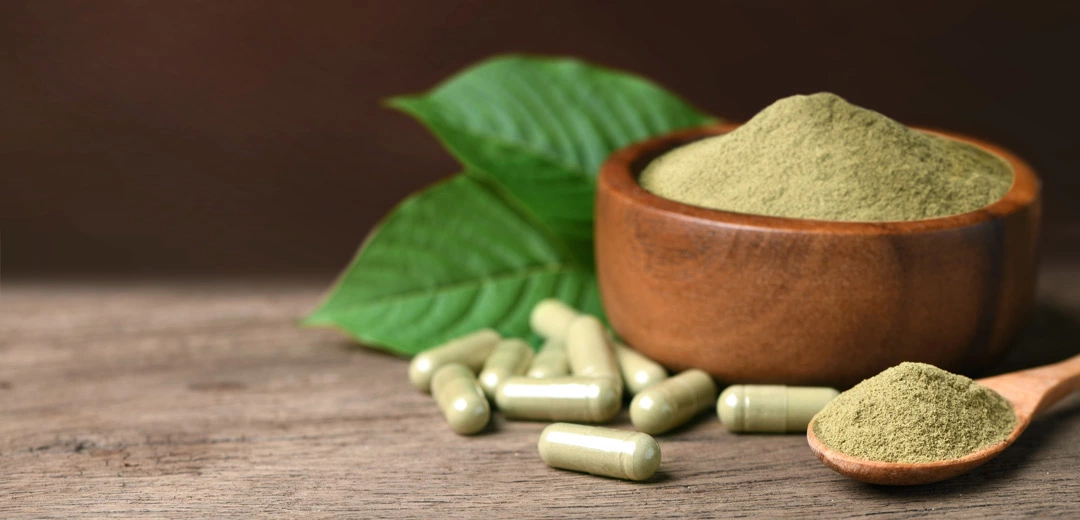Kratom Detox
Attending Kratom Detox In Orange County
Both kratom and opioids have become a major public health concern across the state of California in recent years. As the opioid epidemic continues to pose a massive risk to communities nationwide, more and more people are turning to so-called natural remedies to overcome their substance abuse.
What many of these individuals do not realize is that kratom can be just as dangerous as many opioid drugs. Understanding how kratom affects the body and the dangers associated with this substance is important before using any kind of kratom supplement or treatment.
If you are looking for kratom detox services in Orange County, South Shores Detox and Recovery is here to help. We treat all different kinds of substance abuse, including kratom addiction. Keep reading to learn more about kratom, and what you can expect from the detox process.
What is Kratom?
Kratom is a tropical evergreen tree in the coffee family native to Southeast Asia, where many communities have used it in herbal medicine since at least the 19th century. Kratom leaves have also historically been used for chewing, while its powder form is often used in teas or for smoking.
While kratom is not a controlled substance, the Drug Enforcement Administration (DEA) still advises against using this product, even in low doses, due to a lack of research and information available on the effects of this drug.
These leaves contain many chemical compounds (known as bioactive alkaloids) that can affect the body, with the most well-studied including mitragynine and 7-hydroxymitragynine. These compounds act on opioid receptors in the brain, which can produce a variety of effects, including:
- Increased energy
- Pain relief
- Euphoria
- Drowsiness
- Relaxation
- Reduced anxiety
- Improved mood
Kratom is often used to treat pain, fatigue, and even opioid withdrawal symptoms, as well as sometimes used as a dietary supplement to improve mood and mental health. However, it is important to keep in mind that there is limited scientific evidence to support the use of kratom for treating any specific medical condition.
Using Kratom to Treat Opioid Addiction
In recent years, kratom has gained popularity as a potential treatment for opioid addiction. Because of the alkaloids it contains, its opioid-like effects are believed to help reduce withdrawal symptoms and cravings, making it easier for people to quit using opioids.
However, it is important to note that kratom is not a miracle cure for an opioid use disorder. It is still a relatively new substance, and there is not a lot of data on its long-term safety and effectiveness. Kratom can also be addictive, so it is important to never use this substance unless you have been directly instructed to by a healthcare provider.
Opioid Withdrawal Symptoms
When someone who is dependent on opioids suddenly stops taking them or reduces their dose, this can cause their body to go into shock and cause withdrawal symptoms.
The symptoms of opioid withdrawal can range from mild to severe depending on the type of opioid used, the amount taken, and the length of time the person has been using opioids.
Some of the most common side effects people experience when stopping their opioid use include flu-like symptoms such as chills, runny nose, fever and muscle aches. Other withdrawal symptoms may include:
- Yawning
- Sweating
- Chills
- Restlessness
- Nausea and vomiting
- Diarrhea
- Constipation
- Increased heart rate
- High blood pressure
- Anxiety
- Depression
- Irritability
- Agitation
- Insomnia
- The return of chronic pain or severe pain issues
- Cravings for opioids
Because the opioid withdrawal process can be so severe, it is never recommended to attempt recovering from opioid abuse on your own or through using unapproved substances like kratom. It is always best to seek professional help when recovering from a substance use disorder.
Why Kratom Is Not Effective for Opioid Treatment
While kratom has been recently promoted as a potential treatment for opioid addiction and withdrawal, there is little to no research supporting this claim. In fact, some studies have shown that kratom can actually be addictive and can lead to withdrawal symptoms similar to those of opioids.
Kratom has also been linked to a number of other physical and mental health problems amongst those who consistently use this substance. For these reasons, kratom is not considered an effective or safe treatment for opioid addiction.
The first line of treatment for opioid addiction will usually be medication-assisted treatment (MAT), which uses FDA-approved medications, such as buprenorphine or methadone, to help people manage their withdrawal symptoms and cravings. MAT is highly effective in helping people quit opioids and stay in recovery.
Is Kratom Dangerous?
There is limited research on the safety of kratom, and it is not currently regulated by the FDA. However, the FDA has issued a warning about the risks of kratom, including the potential to develop both physical and mental symptoms as a result of its use.
If you are considering using kratom, it is important to talk to your doctor about the potential physical and psychological symptoms this substance can cause. With that being said, kratom should absolutely not be used by pregnant women or people with liver conditions.
It is also important to make sure that you are buying kratom from a reputable source and to test it for purity. Kratom products can be contaminated with heavy metals, bacteria, and other substances which can be seriously harmful to your health.
Physical Side Effects of Kratom
As with any type of drug abuse, misusing kratom or taking it for extended periods of time can have serious consequences. While the specific health effects this substance can have will vary based on the person and the amount used, some of the most common include:
- Liver damage: Kratom has been linked to liver damage, including acute liver injury and, in rare cases, acute liver failure.
- Death: In rare cases, kratom has been linked to death. This is usually due to polysubstance use, meaning that kratom was taken in combination with other drugs.
- Other side effects: Kratom can also cause other side effects, such as nausea, vomiting, constipation, dizziness, and seizures.
Psychological Side Effects of Kratom
Using kratom recreationally can cause a number of mental health symptoms, particularly for those who are already struggling with a mental illness. Some of the most common include anxiety, depression, insomnia and hallucinations.
In addition to these, kratom also poses a risk for addiction, especially when taken regularly or in higher doses, and people who become dependent on this substance may experience withdrawal symptoms when they stop taking it.
Kratom and Opioid Abuse In California
In 2016, the Food and Drug Administration (FDA) announced that it would be taking serious action against unapproved products being illegally sold as treatments to the public in response to a large sum of kratom products being seized from a natural remedies business in Grover Beach, California.
In light of this increased availability of kratom, it is essential to address that this substance is capable of causing serious harm. There have even been rare cases of overdoses related to kratom. While this is more commonly the case when mixing kratom with other dangerous substances, research suggests that kratom is capable of causing overdose on its own.
As kratom misuse is becoming more prevalent throughout the state, the need for effective treatment options is now more important than ever. Fortunately, treating kratom addiction is possible with medical support and therapy.
Recognizing the Signs of Kratom Addiction
While admitting that your loved one may be struggling with drug and alcohol dependence can be scary, it is important to do so in order to get the help you need. There are many signs that you can look out for when trying to recognize kratom addiction, including:
- Increased tolerance, or needing to take more kratom to achieve the same effects.
- Cravings, such as having a strong urge to use kratom, even when you know it’s not good for you.
- Experiencing physical and emotional discomfort, or withdrawal symptoms, when you stop using kratom.
- Having difficulty controlling your kratom use and finding yourself using more than you intended or for longer than you planned.
- Neglecting responsibilities and noticing your kratom use is starting to interfere with your work, school, relationships, or other important areas of your life.
- Lying to your loved ones about how much kratom you are using or how often you are using it.
- Spending large amounts of money on kratom, especially if this requires borrowing or stealing from others to fund your drug use.
- Jeopardizing your health by continuing to use kratom despite this causing physical or emotional discomfort.
If you or someone you know is displaying any of these signs, it is important to seek help. Kratom addiction is a serious problem, but with the right physical and emotional support it can be treated.
Who Needs Kratom Detox?
Once a drug dependence has developed, quitting kratom cold turkey after a long period of misuse can cause you to develop serious symptoms of kratom withdrawal. While it can seem easier to manage withdrawal symptoms on your own, these symptoms can be severe and unpredictable.
This is especially true for those who are struggling with underlying medical conditions or mental health issues, as these can further complicate your symptoms associated with kratom withdrawal.
4 Signs of Problematic Kratom Usage
Anyone who is struggling with kratom addiction may benefit from kratom detox, including those who:
- Are using kratom in large amounts or for an extended period of time.
- Are experiencing negative consequences from their kratom use, such as financial. problems, relationship problems, or health problems.
- Are having trouble controlling their kratom use.
- Want to quit kratom but are struggling to do so on their own.
Kratom Withdrawal Symptoms
Kratom interacts with the same opioid receptors as other opioid medications, which is what gives the substance its ability to relieve pain. However, this also means that kratom withdrawal symptoms are often very similar to opioid withdrawals and can range from mild to severe.
The severity of the symptoms will depend on a number of factors, including the amount of kratom you were using, how long you were using it, and your individual physiology. Some of the most common moderate withdrawal symptoms include:
- Anxiety
- Restlessness
- Insomnia
- Irritability and aggression
- Mood swings
- Cravings
- Muscle aches
- Abdominal pain
- Runny nose
- Excessive sweating
- Tremors
- Depression
- Fatigue
- Anhedonia (loss of pleasure)
- Difficulty concentrating
- Problems with memory
In rare cases, kratom withdrawal can also cause more severe symptoms, such as seizures or hallucinations. Psychological withdrawal symptoms such as severe depression and suicidal thoughts are also common with this withdrawal syndrome, especially amongst those with mental disorders.
If you are experiencing any of these symptoms, it is important to seek medical attention immediately. Participating in our medically supervised detox program can help you safely and successfully recover from kratom with help from a team of licensed medical professionals.
The Kratom Withdrawal Timeline
The timeline for kratom withdrawal can also vary from person to person. In general, the worst of the symptoms will usually subside within one week, but milder symptoms can linger for months or even years.
This condition is known as protracted withdrawal, and is especially common amongst heavy kratom users, or those who combined their drug use with other dangerous or psychoactive substances.
Because it is hard to estimate when and how kratom withdrawal occurs, seeking treatment is your best option for successfully overcoming this addiction. South Shores Detox and Recovery is here to help make sure you are able to navigate your kratom withdrawal process comfortably and effectively.
What to Expect from the Kratom Treatment Process
While treating addiction is not a one-size-fits-all process, there is still a general process that you can expect to follow when recovering from kratom abuse. For many people, the first step in their kratom recovery process will be participating in a medical detox program.
At our treatment facility, we will provide you with the support and guidance you need to safely navigate the kratom detox process. We can prescribe medications to relieve muscle aches, stomach discomfort, and many other symptoms associated with kratom withdrawal.
We also provide nutritional counseling, therapies, and dual diagnosis treatment to help manage a co-occurring mental health disorder or medical condition during this time. No matter what your recovery needs are, our detox and treatment facility is equipped to handle them.
Kratom Detox and Recovery at Our Treatment Facility
At South Shores Detox and Recovery, we consider each of our client’s physical and emotional well-being to be our highest priority. When you receive treatment at our detox and recovery center, you will have access to a wide variety of rehabilitation services, including:
- Medical detoxification
- Residential treatment
- Partial hospitalization
- Intensive outpatient program
- Peer support groups
- Sober living program
We will work with you to build an individualized treatment plan that is capable of addressing each of your unique needs and provide 24/7 support throughout your recovery process. Kratom can be difficult to quit on your own, but with our support, lifelong recovery is possible.
Get Started at South Shores Detox and Recovery Today!
If you or a loved one is struggling with kratom addiction, help is available to you during this difficult time. Our dedicated team of healthcare providers and addiction specialists are here to make sure you are able to successfully overcome your kratom abuse.
Our treatment approach is not only comprehensive, it is effective. If you are ready to start your recovery or want to learn more about how our program can be a great fit for you, reach out to us today!
Contact us




